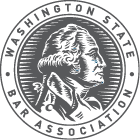Special Commendation Awarded to Spokane Bar Members for Efforts to Address Systemic Racism │ April 16, 2021
SPOKANE, WA (APRIL 16, 2021) — The Washington State Bar Association (WSBA) awarded a special commendation to members of the Spokane County Bar Association (SCBA) for their undertaking to condemn systemic racism (which the Centers for Disease Control and Prevention recently declared a public health crisis) and challenge other legal professionals to take action toward and develop a more fair and equitable justice system.
WSBA President Kyle Sciuchetti will present the special commendation during the hybrid in-person/virtual Board of Governors meeting on April 16. The organizers of the Challenging Systemic Racism in Our Regional Justice System public workshop were nominated by the SCBA.
“It all began with the board coming together to make a statement upon the death of George Floyd,” said SCBA Executive Director Julie Griffith. “The board did not want a statement as a stand-alone; they wanted to take action on their words.”
The commendation was presented to members of the planning committee that over the past year organized the workshop, and who additionally organized a Task Force to examine institutions, procedures, and rules that contribute to systemic racism and to propose methods to dismantle them. Those members are: Francis Adewale, Emily Arneson, Jenaé M. Ball, D.C. Cronin, Theresa Cronin, Michele Fukawa, Julie Griffith, Margo Hill, Natasha Hill, Inga Laurent, Hon. Maryann Moreno, Morgan Maxey, Robert Murphy, Gloria Ochoa-Bruck, Briana Ortega, Kristina Ralls, Juliana Matthews Repp, Hon. Jeffrey Smith, and Rosey Thurman.
Last year, the SCBA issued a statement saying that, “Now is the time to enact meaningful legislation and policies with respect to all aspects of the criminal justice system—from the street to the courtroom.” In fall 2020, the SCBA, its Diversity Section, and members of its Indian Law Section sponsored the all-day workshop, which focused on racial inequality in the civil and criminal law sectors. The event drew attendees from multiple states who wanted to hear from Black, Indigenous and people of color (BIPOC) speakers sharing personal stories of the impacts systemic racism in the justice system. Washington Supreme Court Justices Debra Stephens and Justice Raquel Montoya-Lewis also spoke about the court’s June 4, 2020, letter, which called upon the legal community to recognize our “moral imperative” to dismantle systemic racism.
In keeping with the mission to go beyond mere words and pursue real change, workshop attendees decided to create a Task Force and form sub-committees on such topics as the first appearances and pre-trial conditions of release for racial and ethnic minorities; disproportionate imprisonment in lieu of bail for BIPOC communities; race, culture, and bias in the family law practice; inequities in the community; unique challenges for BIPOC-owned businesses; and the school to prison pipeline.
“The mission of this Task Force is to not just examine the institutions, procedures and rules in place which are contributing to systemic racism, but to figure out how to dismantle them,” members wrote. In the months since, members of the Task Force have engaged key community stakeholders and so far held two meetings. For more information, visit spokanebar.org.
About the Washington State Bar Association
The WSBA operates under the delegated authority of the Washington Supreme Court and exercises a governmental function authorized by the Court to license and regulate the state’s nearly 40,000 legal professionals, including lawyers, limited practice officers, and limited license legal technicians. The WSBA both regulates legal professionals under the authority of the Court and serves its members as a professional association — all without public funding. The WSBA administers the Bar admission process, including the bar exam; provides record-keeping and licensing functions; administers the lawyer discipline system; and provides continuing legal education for legal professionals, in addition to numerous other educational and member-service activities. The Bar’s mission is to serve the public and its members, to ensure the integrity of the legal profession, and to champion justice.






